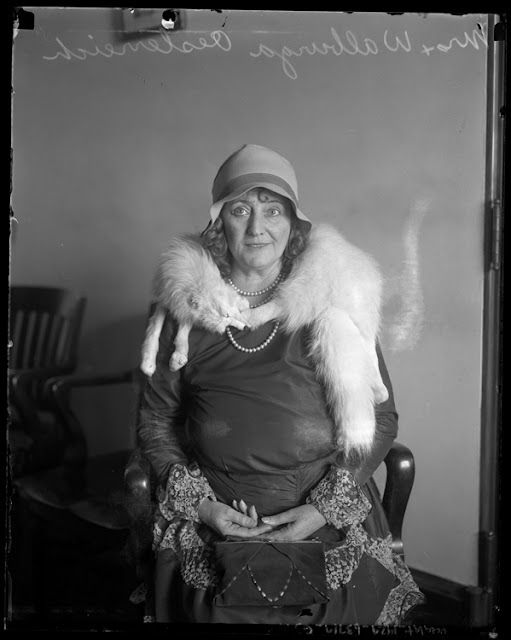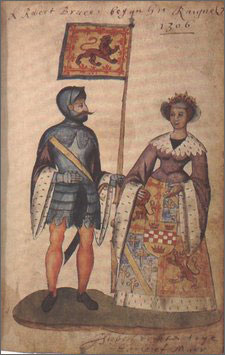Theodore faced one insurmountable hurdle between himself and the Republican nomination that year, and it was named William Howard Taft. The fat man had been Theodore’s chosen successor in 1908. But almost immediately Taft began laboring under the mistaken impression that he was now president, not just Theodore’s stand in. And Theodore then let it be known that he considered Taft to have stolen the presidency under false pretenses, just because he had won the election.
After holding the 1912 Republican convention hostage for two weeks, Theodore’s supporters, representing the progressive wing of the party, finally walked out. This handed the nomination to the hated Taft conservatives, who then purged all progressives from party leadership; it was the original RHINO test - Republican in Name Only. In response Theodore willed into existence the “Bull Moose” Progressive Party, and the resultant three way race for President saw Woodrow Wilson elected. Theodore found that acceptable because he was convinced he could hold the hated Democrat to just one term.
Four years later, Theodore’s biggest hurdle was now his own creation, the Progressive Party. They were devoted to Theodore, but the Republicans blamed them (and Theodore) for their defeat in 1912. Rejoining the two antagonists to retake the White House seemed to an impossible goal. Just the sort of thing Theodore excelled at doing.
First, Theodore convinced the Progressives to hold their convention in early July and in Chicago, at the same time when, and in the same city where the Republicans would be holding their convention. And then he convinced some of the leading members of both sides to hold conferences on reuniting. Theodore’s idea was, of course, that they should reunite around him His agent on the spot was George W. Perkins. And luckily (for us) George had his private secretary Miss Mary Kihm, on a telephone extension, secretly transcribing the conversations. I imagine the poor woman, at some tiny out of the way desk, perhaps even in a closet, holding a handset tight against her ear with one hand and furiously taking shorthand with the other. The conversations she assiduously transcribed were held at all hours of the day and night over a week’s time, and Mary was always there. There are even occasional breaks in the record when, I assume, Mary desperately raced for the bathroom.
Just after noon, on Monday, June 6, 1916, in Chicago, George called Theodore at his home in Oyster Bay, New York, to confirm that it seemed likely that the Republicans would nominate for President, Charles Evens Hughes (above), an ex-Supreme Court Justice. George put Pennsylvanian Senator Boies Penrose on the phone. Theodore had never met Penrose, and you have to wonder what the Sentor from Pennsylvania could be talking about that Perkins could not have said. Penrose informed Roosevelt that “This Hughes proposition has assumed proportions none of us dreamed of before we came here." Then Pensrose asked suggestivly, "Have you any suggestions to make?” Theodore immediatly assured Penrose that if there was a third Roosevelt term, he would make Penrose the leader of the Senate. Penrose disingenuously replied, “I really do not think the question of patronage…is the controlling factor at present.” But he added, “There is a general desire to win.” In other words, he accepted Theodore’s offer.
Theodore’s old friend, Senator Henry Cabot Lodge, then got on the phone and assured Theodore that, “It is going to be either you or Hughes.” But he went on to warn “... if the Progressives nominate you before we act, that blows our plans all up and destroys them.” To this Theodore, just as disingenuously, replied, “…if they do not nominate me I shall breathe a sigh of relief.… I can earnestly say I am not interested in my personal welfare at all; but…I know I am worth two of Hughes.” You could never accuse Theodore of lacking self confidence.
The next night the keynote address at the Republican Convention was delivered by Senator Warren G. Harding, in which he first used the phrase “Founding Fathers: don't we all wish he hadn't? That same night, on a more pragmatic note, Theodore again spoke with George Perkins, with Mary Kihm again on the extension. Speaking of the Republican convention, George told Theodore, “We figure up 81 or 82 votes on the first ballot. … On the second ballot we know we will have more than 75, and then we will be in the running.” George then laid out the plan for handling the "other" convention. “Now suppose that I could get (the progressives)…to authorize me to say to you, confidentially, that provided…the right Vice President and the platform were put up, we would immediately pick up our banners, walk down to the Coliseum (where the Republicans were gathered) and surrender, body, boots and breeches.” Theodore thought that idea sounded great, saying “George, that is a master stroke.” It was all theatre, of course, but Theodore was certain it would be a hit that woud run for at least four years.
Both conventions opened on Wednesday, June 8th, and it was immediately clear that Justice Hughes and the conservatives had no intention of letting Theodore slip in and take the nomination. Theodore told a friend, “Hughes has been a big disappointment thus far. I guess there is no need to tell you that I think Hughes a good deal of a skunk in the attitude he has taken.” I guess anybody was a skunk who did not support Theodore.
All that night, and the next, the conference between the Progressives and Republicans met and argued and cajoled and sought a compromise. But at 3:30 A.M. Friday morning they finally admitted defeat. The Republican conservatives were backing Hughes and the Republican Progressives were backing Roosevelt, and neither would accept any middle ground. That afternoon the Republicans began making nominating speeches for President. At 3:30 that Friday afternoon William White, a leader of the Kansas Progressives, warned Theodore that his group would not hold off much longer. Theodore urged him to wait. “You know I haven’t committed myself in any way about running on a third ticket, but as you know I am very reluctant to do so. I can see that only damage would come from it…Try to keep our convention from acting today. Keep them from acting until tomorrow.” But White warned, “I think it can be very easily handled for tonight provided the Republicans do not…stampede for Hughes. Our people do not like the Hughes proposition.”
That night Theodore’s operative, George Perkins (above), warned that the Progressives were no longer willing to wait. “…they did not propose to listen to any more nonsense about postponing your nomination and were going to put you through.” To this Theodore observed, “George, there is no doubt about it; the other fellows have all the crooks and we have all the cranks.”
At this inopportune moment, Mary Kihm took a bathroom break. It was a little remenisent of Ms. Woods and the 18 1/2 minute gap in the Watergate tapes, although I certainly hope Mary was not gone that long. When she did return to her duties, Theodore was lamenting, “...much as I despise Hughes I would prefer him to one of the burglars (meaning a Taft man). Even the members of our lunatic fringe take that view.” It seemed that at the precise moment that Mary had been taking a tinkle, Theodore had been accepting the unpleasant truth.
The balloting at the Republican Convention put the coda to Theodore’s maneuvers. On the first ballot Charles Hughes (above) got 253 votes, while Theodore got 81, just as George had predicted. But the second ballot, taken almost immediately, saw Hughes surge to 326 votes, while Theodore dropped to 65. On the third round Hughes reached 950 votes and Theodore faded to only 19 true believers. Hughes was declared the Republican nominee by unanimous consent at 12:37 p.m, Saturday June 11th. Stung, the Progressives immediately nominated Theodore.But Theodore was now rethinking his position. He had fought Hughes. He did not like Hughes. He did not trust Hughes, as long as he stood a chance of beating Hughes. But he now told his son Kermit, “Of course I will support him, but I will not be responsible for him.” In other words, Theodore had decided to cut the ground out from under the Progressive Party. They were the last third party to ever have a real chance of winning a presidential election.
Theodore was thinking of his own political needs, at this point. And he was thinking four years ahead. To mend fences, he campaigned for Hughes, and spoke out for him strongly. And with Theodore’s support Hughes even seemed to be pulling ahead on election night. Early the next morning, when a reporter rang up Hughes’ hotel suite, the butler informed him that “The President is asleep.” To which the reporter replied, “Well, when he wakes up, tell him he isn’t the President.”
Theodore had mended his fences. And Hughes was now out of the way. But Theodore would never make the 1920 run for the White House. He died in his sleep at his home on Oyster Bay, on January 6, 1919. Most of those who knew him blamed his death on that trip up the river of Doubt. As Thomas Marshall put it, “Death had to take Roosevelt sleeping, for if he had been awake, there would have been a fight.”
- 30 -



































































